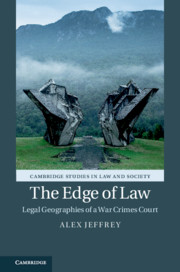Book contents
- The Edge of Law
- Cambridge Studies in Law and Society
- The Edge of Law
- Copyright page
- Contents
- Acknowledgements
- Abbreviations
- Chapter One The Edge of Law
- Part I Producing the Edge of Law
- Part II Politics at the Edge of Law
- Part III Contesting the Edge of Law
- Bibliography
- Index
- Cambridge Studies in Law and Society
Chapter One - The Edge of Law
Published online by Cambridge University Press: 11 December 2019
- The Edge of Law
- Cambridge Studies in Law and Society
- The Edge of Law
- Copyright page
- Contents
- Acknowledgements
- Abbreviations
- Chapter One The Edge of Law
- Part I Producing the Edge of Law
- Part II Politics at the Edge of Law
- Part III Contesting the Edge of Law
- Bibliography
- Index
- Cambridge Studies in Law and Society
Summary
This book argues that law is a form of practice that is productive of an edge. This edge is considered from the outset as a spatial phenomenon: a border, volume, limit or plane. The concept of jurisdiction – the territorial limits of legal authority – immediately puts us in mind of the production of a geographical extent to the exercise of law or a legal system. From this starting point, we can begin to see law as a productive force: it does not reflect preexisting spatial arrangements but brings them into the world through its enactment. But the edge of law is suggestive of more than a Euclidean imagination of spatial reach: it is also pointing to the ways in which law creates insiders and outsiders (often troubling the territorial characteristics of jurisdiction), produces specific sites of legal adjudication and presents the production of legal knowledge as a closed system separate from wider social formations. Rather than one boundary-making process, the edge of law becomes three: the designation of spatial limits to law; the constitution of certain sites, bodies and texts as containing legal expertise; and, finally, a set of mechanisms through which law seeks to obscure this boundary-making work. The production and enactment of law is not an exercise in encompassment, but the discursive, material and performative enactment of enclosure.
- Type
- Chapter
- Information
- The Edge of LawLegal Geographies of a War Crimes Court, pp. 1 - 24Publisher: Cambridge University PressPrint publication year: 2019



